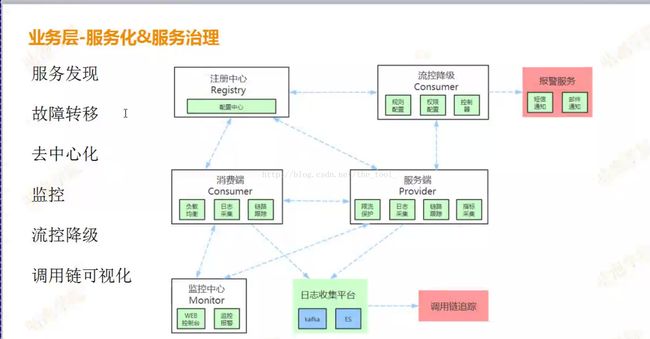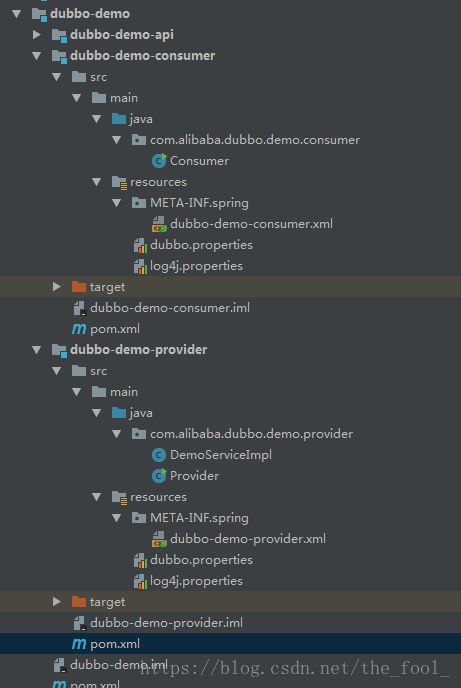参考文档:
官方文档:http://dubbo.io/
duboo中文:https://dubbo.gitbooks.io/dubbo-user-book/content/preface/background.html
1、是什么:
Dubbo |ˈdʌbəʊ| is a high-performance, java based RPC framework open-sourced by Alibaba. As in many RPC systems, dubbo is based around the idea of defining a service, specifying the methods that can be called remotely with their parameters and return types. On the server side, the server implements this interface and runs a dubbo server to handle client calls. On the client side, the client has a stub that provides the same methods as the server.
大体意思:Dubbo是阿里巴巴公司开源的一个高性能优秀的服务框架,使得应用可通过高性能的 RPC 实现服务的输出和输入功能,特点是:可以和Spring框架无缝集成。。。。
首先说说ZK是做什么的:
ZooKeeper是一个分布式的,开放源码的分布式应用程序协调服务,是Google的Chubby一个开源的实现,是Hadoop和Hbase的重要组件。它是一个为分布式应用提供一致性服务的软件,提供的功能包括:配置维护、域名服务、分布式同步、组服务等。
在dubbo中,dubbo的服务提供者会在zookeeper上面创建一个临时节点,表明自己的ip和端口,当消费者需要使用服务时,会先在zookeeper上面查询,找到服务提供者,做一些负载的选择(比如随机、轮流),然后按照这些信息,访问服务提供者。
ZK的安装:https://blog.csdn.net/the_fool_/article/details/80774500
2、官方文档中的解释:
场景1、当服务越来越多时,服务 URL 配置管理变得非常困难,F5 硬件负载均衡器的单点压力也越来越大。
此时需要一个服务注册中心,动态的注册和发现服务,使服务的位置透明。并通过在消费方获取服务提供方地址列表,实现软负载均衡和 Failover,降低对 F5 硬件负载均衡器的依赖,也能减少部分成本。
场景2、当进一步发展,服务间依赖关系变得错踪复杂,甚至分不清哪个应用要在哪个应用之前启动,架构师都不能完整的描述应用的架构关系.
这时 需要自动画出应用间的依赖关系图,以帮助架构师理清理关系。
场景3、接着,服务的调用量越来越大,服务的容量问题就暴露出来,这个服务需要多少机器支撑?什么时候该加机器?
为了解决这些问题,第一步,要将服务现在每天的调用量,响应时间,都统计出来,作为容量规划的参考指标。其次,要可以动态调整权重,在线上,将某台机器的权重一直加大,并在加大的过程中记录响应时间的变化,直到响应时间到达阀值,记录此时的访问量,再以此访问量乘以机器数反推总容量 。
=================================================================================================
3、架构(这个图刚看时不是很理解,但是结合组件来看还是很清晰的):
==========================================================================
4、官方demo:
1、项目结构:
2、导包(pom.xml):
4.0.0
com.alibaba
dubbo-demo
2.5.8
dubbo-demo-provider
jar
${project.artifactId}
The demo provider module of dubbo project
false
com.alibaba
dubbo-demo-api
${project.parent.version}
com.alibaba
dubbo
${project.parent.version}
com.101tec
zkclient
org.apache.curator
curator-framework
com.alibaba
fastjson
log4j
log4j
org.slf4j
slf4j-api
org.apache.commons
commons-lang3
3.4
io.netty
netty-all
4.0.35.Final
3、生产者:
public class DemoServiceImpl implements DemoService {
public String sayHello(String name) {
System.out.println("[" + new SimpleDateFormat("HH:mm:ss").format(new Date()) + "] Hello " + name + ", request from consumer: " + RpcContext.getContext().getRemoteAddress());
return "Hello " + name + ", response form provider: " + RpcContext.getContext().getLocalAddress();
}
}提供服务:
public class Provider {
public static void main(String[] args) throws Exception {
//Prevent to get IPV6 address,this way only work in debug mode
//But you can pass use -Djava.net.preferIPv4Stack=true,then it work well whether in debug mode or not
System.setProperty("java.net.preferIPv4Stack", "true");
ClassPathXmlApplicationContext context = new ClassPathXmlApplicationContext(new String[]{"META-INF/spring/dubbo-demo-provider.xml"});
context.start();
System.in.read(); // press any key to exit
}
}配置文件dubbo-demo-provider.xml:
4、消费者:
public class Consumer {
public static void main(String[] args) {
//Prevent to get IPV6 address,this way only work in debug mode
//But you can pass use -Djava.net.preferIPv4Stack=true,then it work well whether in debug mode or not
System.setProperty("java.net.preferIPv4Stack", "true");
ClassPathXmlApplicationContext context = new ClassPathXmlApplicationContext(new String[]{"META-INF/spring/dubbo-demo-consumer.xml"});
context.start();
DemoService demoService = (DemoService) context.getBean("demoService"); // get remote service proxy
while (true) {
try {
Thread.sleep(1000);
String hello = demoService.sayHello("world"); // call remote method
System.out.println(hello); // get result
} catch (Throwable throwable) {
throwable.printStackTrace();
}
}
}
}配置文件dubbo-demo-consumer.xml:
与cloud的区别?如何选择?
个人观点:博主了解的并不深入,个人觉得springcloud更加全面,使用起来更顺手一点。等熟练用过后会考虑做个对比。


